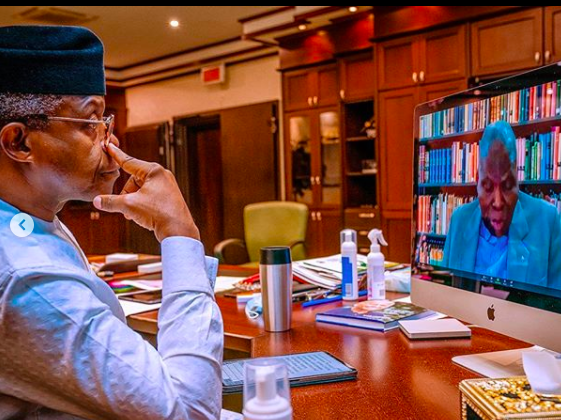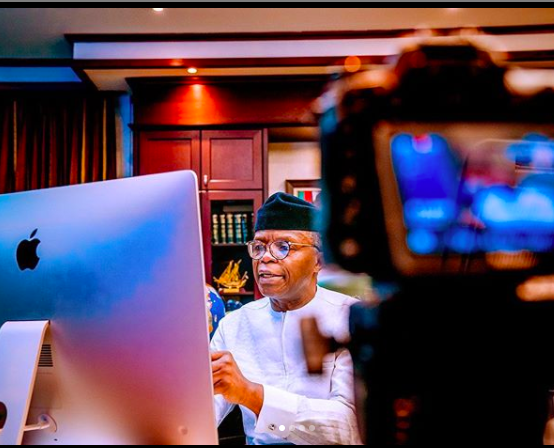Nigeria Leadership Initiative Webinar Series Themed: Rebuilding Our National Values System
SPEECH BY HIS EXCELLENCY, PROF. YEMI OSINBAJO, SAN, GCON, VICE PRESIDENT OF THE FEDERAL REPUBLIC OF NIGERIA AT THE NIGERIA LEADERSHIP INITIATIVE WEBINAR SERIES THEMED: REBUILDING OUR NATIONAL VALUES SYSTEM ON THE 3RD OF OCTOBER, 2020
PROTOCOLS
The Nigeria Leadership Initiative, NLI and especially it’s visioner, Segun Aganga, deserves our commendation for providing the opportunity for this conversation on “Rebuilding Our National Values System.” The timing is fortuitous.
First, recently the President launched the National Ethics and Integrity Policy. The core values of this policy are human dignity, participation, patriotism, personal responsibility, integrity, national unity and professionalism.
The policy is founded on section 23 of the Constitution which provides that the national ethics shall be discipline, integrity, dignity of labour, social justice, religious tolerance and patriotism.
Secondly, this conversation comes on the 60th anniversary of our nationhood, I think that is particularly fortuitous, because perhaps the most notable activity marking our Diamond Jubilee has been the debates in various fora on whether the journey so far can by any measure be described as successful.
Most of the reflections have sought to answer the question by some rough and ready measurement of our current level of development, given the opportunities, the potentials that our country possesses and also how the behavior of our business and political elites, our religious elites, our politics, policy decisions have shaped those outcomes.
The point to be noted is that practically all discussions on our national odysseys so far center around development and for good reason. This is by far the most important dynamic in measuring individual or communal success. This is why any discussion on values is only really useful if it is based on values as a praxis that is tied to the question of how such values will influence or impact the development of society, or in our case, the development of our nation.
This point is particularly important because it is possible for us to have a lively discussion of the importance of values in and of themselves. Values as virtues which are useful in the purpose of higher and many times, spiritual, individual or communal purpose.
This is not my focus in this remark, rather I am focused on the existential role of values in the socio-economic development of the nation and I will illustrate my point just for brevity by just two examples as I go along.
Shaping our discussion on values as a fundament of development is also important because it helps to focus the individual and communal mind on survival, especially economic survival which is dear to the heart of all and by this I mean, if we shape our discussions around our value system, around what is most dear to the hearts of most of us, which is our economic survival, it is very helpful, because it directs us to how our value system will promote us, will promote our economic survival as individuals and as a collective eventually and also how it will promote our social development first as individuals and then as a collective. Any other paradigm will almost invariably fall in our minds into the category of the exhortatory or the moral preachments and there are many who will say that is already a surfeit of moral preachments and exhortatory precept on value.
So, the value system we need is one that promotes national development, especially economic development. It must be capable of engendering unity and a shared vision. It must provide a causal connection with economic development and the end result is the creation of a happy society.
I will go back to those three points I made, the relevance of the values system. The first Is that it must engender National Unity, and this is very important.
The second point is that there must be a way by which our value system helps to focus our minds on a shared vision. It must provide a causal connection with our economic development. In other words, we must be able to say that these sets of values conduce to economic development in a particular way and it must also be one that is capable of showing us, the individual, that a happy society, a community that is happy, a community of people that are prepared to live together and work together is possible on account of this value system.
So, for purposes of national unity, for example, we must accept that unity and peace are important outcomes but the condition predicate for both unity and peace is justice, both legal and social justice. In our context, justice includes the notions of fairness, equity, equality and it is significant that our Constitution is replete with references to these themes.
Our Constitution affirms that “the Federal Republic of Nigeria shall be a state based on the principles of democracy and social justice” and also asserts that “the state social order is founded on the ideals of Freedom, Equality and Justice.”
So, it is obvious that the mandates of our public institutions must be to transparently ensure that there is fairness in the availability of opportunity to all regardless of, tribe, religion or gender or any other considerations. The primary criterion should be merit and I must spend just a bit of time on this.
First, the availability of opportunity and I am saying that our public institutions must be equipped to provide opportunities that enable everybody to have access to opportunities regardless of tribe, religion or gender. But the primary criterion should be merit. While inequalities may be addressed by affirmative provisions such as federal character, the primary consideration should be merit.
A meritocracy is crucial in an economically viable value system because it rewards talent and enterprise. And it is talent and enterprise that would drive sustainable growth.
I want to make this point because time and time again we get arguments around the question of whether the dominant principle in appointments, for example, to public institutions should be federal character. The dominant principle should be merit. Federal character is essentially affirmative; what it seeks to do is to create a balance and even if we are to create that balance, that balance should still be based on merit.
So, for example, if we say that a particular zone should produce a particular candidate for whatever position, that zone should be required to produce the very best and it is possible to find the very best.
What you find repeatedly is a situation where the choices are not based on merit and of course, everything simply goes around the question that all we are trying to do is to create a balance. But meritocracy is crucial as a value in and of itself and the moment we depart from meritocracy, we cannot tie our value system to development in any meaningful way.
The rule of law, the administration of justice is at the heart of a beneficial value system. The uncompromising prosecution of criminal activity, the fair and just adjudication of civil disputes, is fundamental to any notion of a strong value system, one that will deliver national development.
These institutions that must deliver these values must be deliberately invested in both in terms of material infrastructure and the quality of personnel. Where the institutions for the resolution of conflicts and disputes are trusted and judicial outcomes are preponderantly fair and predictable, unity and stability are clearly more likely.
This is very important especially with respect to judicial institutions. The choice of judges, the appointment of judicial personalities is crucial in determine or not whether these institutions will be able to deliver on the value of justice and this is completely intuitive. Where you have judges that are not picked on the basis of their integrity, knowledge and competence, then anything is possible.
So, we must invest in quality personnel, quality individuals and quality materials for judicial appointment. So the whole question of who is appointed, how they are appointed, the examinations and test they must go through, the public scrutiny they must go through, must be considered as important parts of the whole creation and establishment of a value system, These are the practical details, the nuts and bolts of a value system to deliver of its promises.
Inherent in integrity as a value are precepts such as trust, trustworthiness, honesty and the keeping of commitments. While these are also important moral precepts, for our purposes we emphasize the concrete economic and social value they bear. In other words, fidelity to integrity is essential for the attainment of socio-economic prosperity.
The important point is how to build a value system that is based on integrity. Now that value system must be one where we are able to show that integrity pays. In other words, we are able to show that there is an economic and social benefit in being a person of integrity so that it goes beyond mere moral preachment or mere exaltation, it really delivers concrete value.
In addition, hard work, innovation and thrift, are all economically beneficial values. We see, for example, that in the wealthiest societies, thrift enabled the accumulation of capital through savings and investments, while the pursuit of literacy, which was inspired by the esteem in which knowledge was held, permitted the development of human capital. These two trends were crucial for the economic development of many of the wealthiest nations.
Economic growth rests upon the substructure of values. The basis of the entire credit system as we know is trust. Indeed, the word credit is derived from the Latin word “credere” — to believe or to trust. For a credit facility to be extended to a person, trust is placed in the borrower and his or her willingness and ability to repay. When we say that there is a credit crunch, we are referring essentially to a lack of trust. This has significant implications for the economy. Banks cannot lend to people when fraud is widespread, where the default is widespread and as we know, enterprise and industry cannot flourish without credit.
Financial institutions may also be reluctant to lend because they cannot trust that the government will remain consistent with regulatory policies. For the same reason, investors may be discouraged from investing. When we speak of investor confidence, we are merely describing the level of trust investors are willing to place in an environment. Sometimes, citizens do not trust that their taxes will not be embezzled due to official corruption, so they are unlikely to see any value in paying their taxes. If people stop trusting the media, they are more likely to fall prey to merchants of fake news which can have a destabilizing effect on a nation. When everyone is self-seeking, there can be no trust and without trust, it is impossible to sustain a sort of society we are talking about. The significance of trust for the workings of the economy and society are far-reaching.
I think that these bears repeating, that trust is not just a moral value, it is the entire foundation of a fruitful and viable society. It’s fundamental to economic development, it’s fundamental to social development, it’s fundamental to practically everything that society is based on. Trust is fundamental, as we have seen, to credit, it is fundamental to the relationship between the government and the people, the relationship between investors and the economies in which they want to invest.
So, let us take a quick look at how patriotism works, especially in building the value system. We don’t have to define patriotism, but very often, we are called upon to be patriotic. But we know that belonging to a team and feeling that we are part of a team is important in engendering patriotism.
For example, when Nigeria is playing a match anywhere in the world, we are all very patriotic. In other words, as you know, every Nigerian is watching and cheering our team along and some are praying and just exalting our team and hoping that we would win. So, we can very clearly see that where there is a shared vision and where we feel that we’re part of a team, it is not so difficult to be patriotic.
So, there is a sense in which patriotism calls for people feeling that their government has their back. When people are called upon to be patriotic, it works both ways. In other words, people are not necessarily patriotic because they were asked to be patriotic or because they were taught to be patriotic, but they are patriotic because they feel they have the government working in their favor or government watching their back. There is a mutuality here that needs to be satisfied and this is important in building a value system that is based on patriotism.
Just as I round off, what are the practical steps that we need to take?
I think one of the most important steps is the teaching of these precepts, the teaching of our value system. But the teaching of our value system, of course, is not as important as exemplified in leadership the values that we seek to build.
Teaching is crucial and I think it was General Gowon who mentioned that we need to go back to the teachings of History and Civics, but of course, we have re-introduced History. The teaching of Civics and the teaching of our value system from the very early age; the teaching of our Constitution, the rewriting of our history such that it represents the accuracy of values and it projects what we have done right, it projects our values, it projects what is the essence of the Nigerian, what is the essence of our moral values, of our ethical values, is crucial also. These teachings must be done deliberately, it has to be planned deliberately. Part of that is what is going on in the new curriculum that the Ministry of Education is working on; trying to see how we can in ebb the policies, the ethics in our teaching curriculum.
The other point is in rewarding these values asides from the economic rewards and we have pointed out what those economic rewards must be. Our society and government must also reward these values in significant ways.
Our national honours and national conferment must be based on merit, must be tied to our value system so that those who are given national honours are persons all of us can see, deserve it, especially as we tie it to our value system. So, when our kids are taught in school our value systems in school and see those who are conferred with national honours, they are able to tie what they are taught to those they see are being celebrated.
These are important connections; they are practical ways of ensuring we are able to rebuild our national value system and ensure that the value system endures and that they make sense for economic development.
Thank you very much for listening.





